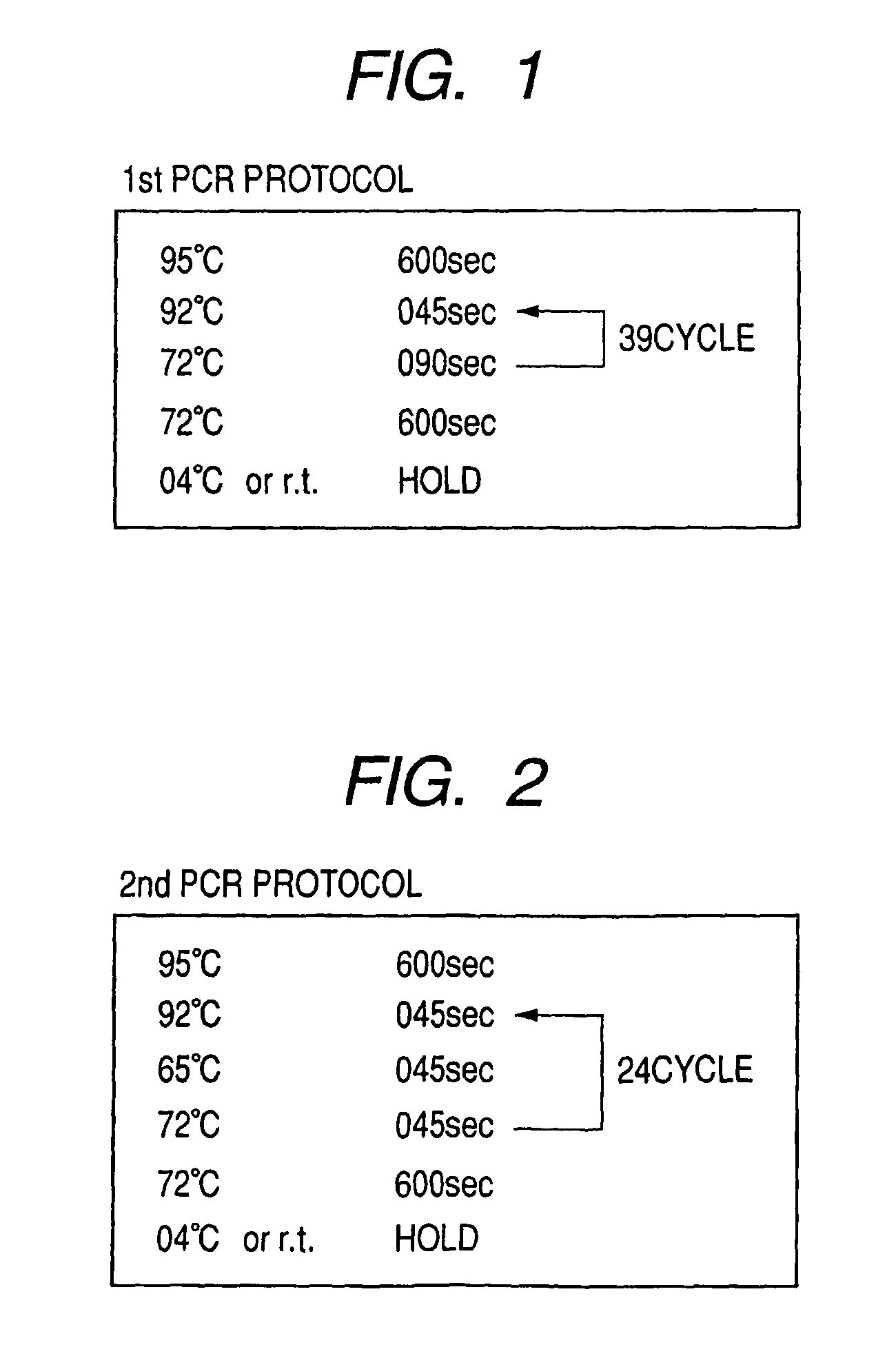Probe, probe set, probe-immobilized carrier, and genetic testing method
a technology of probeimmobilization carrier and probe, which is applied in the field of probe, probe, probe set, and probe-immobilized carrier, can solve the problems of difficult task of probe establishment, and achieve the effect of quick and precise identification
- Summary
- Abstract
- Description
- Claims
- Application Information
AI Technical Summary
Benefits of technology
Problems solved by technology
Method used
Image
Examples
example 1
[0080]In this example, microorganism detection using 2-step PCR will be described.
1. Preparation of Probe DNA
[0081]Nucleic acid sequences shown in Table 1 were designed as probes to be used for detection of Bacteroides thetaiotaomicron. Specifically, the following probe base sequences were selected from the genome part coding for the 16s rRNA gene of Bacteroides thetaiotaomicron. These probe base sequences were designed such that they could have an extremely high specificity to the bacterium, and a sufficient hybridization sensitivity could be expected without variance for the respective probe base sequences. The probe base sequences need not always completely match with those shown in Table 1. Probe base sequences having base lengths of 20 to 30, including the probe base sequences shown in Table 1, are also included in the probe base sequence shown in Table 1.
[0082]
TABLE 1Name ofProbeSEQmicroorganismNo.ID NO.SequenceBacteroidesBT1405′ AAGAATTTCGGTTATCGATGGthetaiotao-GGATGC 3′micron...
example 2
Preparation of DNA Chip by Which Various Bacterial Species can be Simultaneously Determined
[0119]In a manner similar to the stage 1 (Preparation of Probe DNA) of Example 1, probes having base sequences as shown in Table 8 below were prepared.
[0120]
TABLE 8Bacterial species ofSEQinterestProbe sequence (5′→3′)ID NO.Anaerococcus prevotiiTCATCTTGAGGTATGGAAGGGAAAGTGG35GTGTTAGGTGTCTGGAATAATCTGGGTG36ACCAAGTCTTGACATATTACGGCGG37Bacteriodes fragilisAAGGATTCCGGTAAAGGATGGGGATG38TGGAAACATGTCAGTGAGCAATCACC39BacteriodesAAGAATTTCGGTTATCGATGGGGATGC40thetaiotaomicronAAGTTTTCCACGTGTGGAATTTTGTATGT41AAGGCAGCTACCTGGTGACAGGAT42Clostridium difficileAATATCAAAGGTGAGCCAGTACAGGATGGA43CCGTAGTAAGCTCTTGAAACTGGGAGAC44TCCCAATGACATCTCCTTAATCGGAGAG45Clostridium perfringensAACCAAAGGAGCAATCCGCTATGAGAT46GAGCGTAGGCGGATGATTAAGTGGG47CCCTTGCATTACTCTTAATCGAGGAAATC48Eggerthella lentaGGAAAGCCCAGACGGCAAGGGA49CCTCTCAAGCGGGATCTCTAATCCGA50TGCCCCATGTTGCCAGCATTAGG51Fusobacterium necrophorumTTTTCGCATGGAGGAATCATGAAAGCTA52AGATGCGCCGGTGC...
example 3
[0126]Using the DNA chip prepared in Example 2, detection was attempted when a plurality of bacterial species was present in an analyte.
[0127]A culture medium in which Bacteroides thetaiotaomicron and Clostridium difficile were cultured was prepared and subjected to the same treatment as that of Example 1 to react with the DNA chip.
[0128]As a result, only the spots of the probes having SEQ ID NOS. 40, 41, 42, 43, 44, and 45 showed high fluorescence intensity, so the coexistence of those bacteria was able to be simultaneously confirmed.
[0129]The present invention is not limited to the above-mentioned embodiments and various changes and modifications can be made within the spirit and scope of the present invention. Therefore to apprise the public of the scope of the present invention, the following claims are made.
[0130]This application claims the benefit of Japanese Patent Application No. 2006-100623, filed Mar. 31, 2006, which is hereby incorporated by reference herein in its entire...
PUM
| Property | Measurement | Unit |
|---|---|---|
| melting temperatures | aaaaa | aaaaa |
| concentration | aaaaa | aaaaa |
| size | aaaaa | aaaaa |
Abstract
Description
Claims
Application Information
 Login to View More
Login to View More - R&D
- Intellectual Property
- Life Sciences
- Materials
- Tech Scout
- Unparalleled Data Quality
- Higher Quality Content
- 60% Fewer Hallucinations
Browse by: Latest US Patents, China's latest patents, Technical Efficacy Thesaurus, Application Domain, Technology Topic, Popular Technical Reports.
© 2025 PatSnap. All rights reserved.Legal|Privacy policy|Modern Slavery Act Transparency Statement|Sitemap|About US| Contact US: help@patsnap.com

